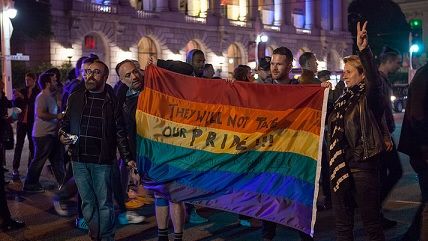Heroes on Screen and Among Us
Everyday evil leaves people looking for heroes

This is why we have superhero movies. And why they are so popular.
It's easy to look down on the monotony with which the assembly plant in Hollywood turns out such fare—blockbusters filled with demi-gods and CGI monsters and special effects, all carried forward by a narrative arc as predictable as the taste of a fast-food burger, and with about as much thematic depth. "Strip away the phony tinsel of Hollywood," said Oscar Levant, "and you'll find the real tinsel underneath."
There is truth in that, but it is not the whole truth. Because if you strip away the synthetic appeal of the superhero-movie genre you will also find the real appeal. Especially in times like this one, when tragic horror hangs over the country like a poison fog.
Events like the massacre in Orlando inflict agony and despair a thousand different ways, not the least of which is the sense of helplessness they dispense. The news unfolds on the screen and the mind thinks no, no, no, please no, and the nos mean nothing, it has already happened and it's too late to be stopped, and even if were not too late what would you do? Jump in a car or a plane and race to the scene and—then what?
Americans are mostly immune to the mass slaughter that much of the world suffers as a steady diet: the car bombs, the suicide bombers, the machete-wielding fanatics, the tribal warlords with their hordes of hopped-up teenage soldiers, the tyrants who terrify the populace by sending tortured loved ones home in garbage bags. But now and then—and more and more—the virus jumps the ocean barrier and shows up in Oklahoma City, or Columbine, or New York, or Blacksburg or Fort Hood or Aurora or Newtown or Boston or Charleston or San Bernardino. Or Orlando.
Only it didn't really jump the barrier. It was here all along, lying dormant, and its eruption reminds us that for all we might hope otherwise there is genuine evil in the world, not just there but here too, and at times it seems too great for ordinary people to comprehend, let alone confront. That is the sense the superhero movie speaks to: the wish to have in the world a force for good great enough to vanquish the forces of inexplicable evil. There is a reason those movies, so steeped in pop culture, nevertheless have soaring, classical-music soundtracks. It is the music that best conveys noble grandeur.
This is nothing new. It is as ancient as the sagas of Gilgamesh and Sigurd, Odysseus and Beowulf—and as fresh as a toddler using a pillowcase as a cape. It is woven into the Arthurian legends—and The Lord of the Rings, and Star Wars and Harry Potter. Not to mention the Abrahamic religions. When the world is too much for us, we look for something bigger: a hero in fiction or faith.
Which is perfectly fine, so long as we don't overlook the heroes in fact: the Alvin Yorks and Audie Murphys. The Harriet Tubmans and Rosa Parks, the Geronimos and Sitting Bulls. The firefighters who ran up the stairs on 9/11; Todd Beamer and Pat Tillman; Oz Geist, Rone Woods, and the other defenders of the CIA compound in Benghazi. And countless more, whose stories have been told often and well.
And yet there are other heroes, too numerous to name, whose stories will never be told—at least not in full: Victoria Soto, a teacher who died shielding her first-graders at Sandy Hook. Chris Mintz, who was shot several times as he blocked a door during the mass shooting at Umpqua Community College last year. Adel Termos, who sacrificed himself by tackling a suicide bomber in a Beiruit market in 2015, saving scores of lives.
And there are still others: The cops who wrestle knives away from drunks. The priests who talk desperate souls out of desperate acts. The nurses who keep watch while critically ill patients struggle to make it till morning. The neighbors who coach Little League and take inner-city boys on camping trips, the mentors of Big Brothers Big Sisters, the moms who stand in the rain outside Walmart helping sell Girl Scout cookies, the bus driver with a kind word for the widow and the CEO who teaches Sunday School. . . . All do their part to keep the darkness at bay. As do so many more.
"The growing good of the world," wrote George Eliot, "is partly dependent on unhistoric acts; and that things are not so ill with you and me as they might have been, is half owing to the number who lived faithfully a hidden life, and rest in unvisited tombs." There is no soaring soundtrack for those hidden lives—but they deserve one.
This column originally appeared at the Richmond Times-Dispatch.


Show Comments (15)